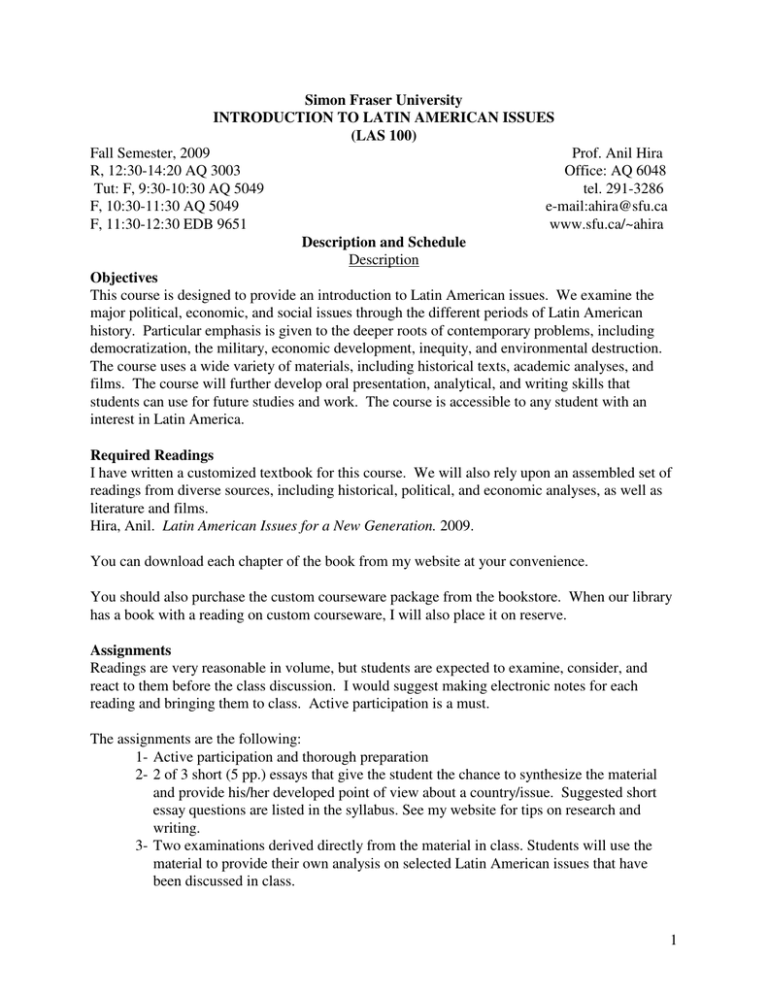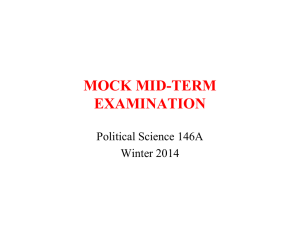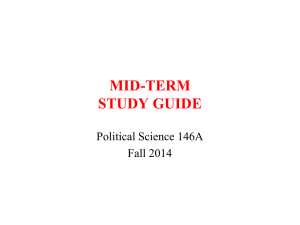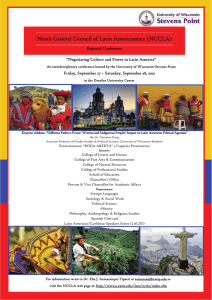
Simon Fraser University
INTRODUCTION TO LATIN AMERICAN ISSUES
(LAS 100)
Fall Semester, 2009
R, 12:30-14:20 AQ 3003
Tut: F, 9:30-10:30 AQ 5049
F, 10:30-11:30 AQ 5049
F, 11:30-12:30 EDB 9651
Prof. Anil Hira
Office: AQ 6048
tel. 291-3286
e-mail:ahira@sfu.ca
www.sfu.ca/~ahira
Description and Schedule
Description
Objectives
This course is designed to provide an introduction to Latin American issues. We examine the
major political, economic, and social issues through the different periods of Latin American
history. Particular emphasis is given to the deeper roots of contemporary problems, including
democratization, the military, economic development, inequity, and environmental destruction.
The course uses a wide variety of materials, including historical texts, academic analyses, and
films. The course will further develop oral presentation, analytical, and writing skills that
students can use for future studies and work. The course is accessible to any student with an
interest in Latin America.
Required Readings
I have written a customized textbook for this course. We will also rely upon an assembled set of
readings from diverse sources, including historical, political, and economic analyses, as well as
literature and films.
Hira, Anil. Latin American Issues for a New Generation. 2009.
You can download each chapter of the book from my website at your convenience.
You should also purchase the custom courseware package from the bookstore. When our library
has a book with a reading on custom courseware, I will also place it on reserve.
Assignments
Readings are very reasonable in volume, but students are expected to examine, consider, and
react to them before the class discussion. I would suggest making electronic notes for each
reading and bringing them to class. Active participation is a must.
The assignments are the following:
1- Active participation and thorough preparation
2- 2 of 3 short (5 pp.) essays that give the student the chance to synthesize the material
and provide his/her developed point of view about a country/issue. Suggested short
essay questions are listed in the syllabus. See my website for tips on research and
writing.
3- Two examinations derived directly from the material in class. Students will use the
material to provide their own analysis on selected Latin American issues that have
been discussed in class.
1
Pls. bring the course reader to class and tutorials- time permitting, we may read and discuss some
of these important texts.
Grading
The assignments will be graded proportionally as follows:
-participation, including attendance 15%
-mid-term examination, 25%
-2 short essays of 5-7 pp., 30% (15% each) (choose any 2 of 3)
-final examination, 30%
Assignments are due at the beginning of class. See my website for grading and other policies.
Essays should be analytical arguments around a thesis, not just summaries.
Plagiarism
Plagiarism, or the use or ascription of someone else’s work as your own, is a serious
offence. For university policies, please see http://www.sfu.ca/policies/Students/index.html and
http://students.sfu.ca/academicintegrity
Office Hours
Office hours are M-F 9-4 except during class times and by appointment. I generally do not mind
students dropping in without an appointment unless the issue requires significant time. You can
drop me a quick e-mail to set up a time; I will usually reply that day. I do have other meetings at
times, but will try my best to accommodate. There will be a class e-mail list for discussion.
Weekly Schedule
I.
Introduction to Course, Analytical Methods of Social Sciences (Sep. 10)
Intro. of professor, students, key terms, themes, and background
-introduction of persistent political, economic, and social problems of development in LA
Readings: Hira, preface + c. 1
II.
The Geographic and Historical Context, Precolonial Period (Sep. 17)
-geographic and demographic overview of Latin America
-Paradise lost? How the West was lost
Readings:
-Hira, c. 2, pp.1-7 (up to section on independence)
-Miguel León-Portilla, “Mesoamerica before 1519,” 3-14 and John Murra, “Andean Societies
before 1532,” 59-90 in Leslie Bethell, ed., The Cambridge History of Latin America, vol. I:
Colonial Latin America, Cambridge U Press, 1984 F 1410 C1834 (1)
For Discussion:
-Gerard Chaliland, Mirrors of A Disaster: A Chronicle of the Spanish Military Conquest of
America, Watertown, MA: Blue Crane Books 1994, F1230 C513 1994, pp.5-28 (2)
2
Film: Conquistadors
III.
Colonialism and Independence- History in Perspective (Sep 24)
-Hidalgo’ & Bolivar’s visions; the Tricks of Time (persistence and resistance in history)
-Hira, c. 2, pp.8-12 (rest of chapter)
-Barotolome de las Casas, Destruction of the Indies, pp.1-12, Indianapolis: Hackett, F 1211
C31413 2003 ISBN 0872206262 (3)
-David Bushnell, 183-205 in Simón Bolivar: Liberation and Disappointment, Toronto: Pearson
Longman, 2004, F 2235.3 B955 2004 (4)
-For Discussion: Steve J. Stern, “The Tricks of Time: Colonial Legacies and Historical
Sensibilities in Latin America,” in Jeremy Adelman, ed., Colonial Legacies, NY: Routledge,
1999 F 1412 C634 1999 (5)
Film: Legacy
IV.
Formation of Nations: Civil Wars and the Mexican Revolution (Oct 1)
The “cosmic race”; “Adrift in storms”; the revolutionary solution
Readings:
-Jose Marti, “Our America,” eds. Deborah Shnookal and Mirta Muniz, Jose Marti Reader:
Writings on the Americas, NY: Ocean Press, F1785 M3813 1999 (6)
-Peter Bakewell, “Adrift in Storms: Caudillos and Penury,” in A History of Latin America:
Empires and Sequels 1450-1930, Blackwell, 1997 F 1410 B18 1997 (7);
-Michael J. Gonzales, The Mexican Revolution 1910-1940, Albuquerque: U. of New Mexico
Press, 2002, pp.133-59 & 261-70. F 1234 G6248 2002 (8)
For discussion: Miguel Angel Centeno, pp.167-98 in Blood and Debt: War and the Nation-State
in Latin America, University Park: the Pennsylvania State U. Press, F1410.5 C46 2002 (9).
Film: Mexico: the Frozen Revolution, V0435, 60 mins
V.
Revolution (Oct 8)
final solutions; History’s judgments; why rich students are dangerous
Readings:
-Hira, c.3, “Revolutions”
-E. Bradford Burns, “The Revolutionary Option,” c.9, in Latin America: A Concise Interpretive
History, Englewood Cliffs, N.J. : Prentice-Hall, 1994, pp.263-99 F 1410 B8 1994 3 copies (10);
-Javier Corrales, “The Gatekeeper State: Limited Economic Reforms and Regime Survival in
Cuba, 1989-2002,” Latin American Research Review, 29,2 (June 2004): 35-65. Download from
library database
-Octavio Paz, The Labyrinth of Solitude, “From Independence to the Revolution,” New York :
Grove Press, [1961] pp.117-49 F 1210 P318, 3 copies (11)
For discussion/consideration:
3
-Fidel Castro- “History will absolve me,” will be sent electronically
Essay 1 due: Short essay, 5 pp.
a- How were race or gender managed under pre-colonial or colonial empires? What implications
might these arrangements have on present day inequities? or
b- How would Octavio Paz describe the trajectory of the Cuban Revolution? or
c- Consider carefully Centeno’s observations about national identity in Latin America?
Comment on his research focus and methodological approach? Do you find his argument
compelling? Explain why or why not using concrete examples or evidence.
VI.
Mid-term Examination (Oct 15)
VII. LA Vulnerability (Oct 22)
Readings:
-Eduardo Galeano, Open Veins of Latin America, pp.11-18, NY: Monthly Review Press, HC 125
G25313 3 copies (12)
-Hira, c.4, International Relations and U.S. Foreign Policy Towards Latin America, -Hira, c.5,
“Democracy and Human Rights”
VIII. The Latin American Military and Human Rights (Oct. 29)
Readings:
-Film, “Death and the Maiden,” will be shown during this class period. PN 1997 D38 1995, 105
mins
IX. Latin American Economies (Nov 5)
Why economics is important even if you’re afraid of it; Patterns and trajectories in LA economic
development- why the future is more of the past in LA
Readings:
-Hira, c.6, will be sent electronically
Essay 2 due: Analyze the dilemmas laid out by the film, “Death and the Maiden,” and suggest
how the legacy of military rule might best be worked out by Latin American societies.
X. Latin American Social Issues: Social Movements and Gender (Nov 12)
The future of “revolution in LA,” acc. to some; obstacles and strategies to male/female equity
Readings:
-Hira, c.7, “Social Movements”
-Sylvia Chant, “Introduction,” pp.1-18 in Gender in Latin America HQ 1460.5 c44 2003 2 copies
(13)
-Mala Htun, “From “Racial Democracy” to Affirmative Action: Changing State Policy on Race
in Brazil,” Latin American Research Review, 39,1 (Feb. 2004):60-89. Download from library
4
database
recommended: Peter H. Smith, Jennifer L. Troutner and Christine Hunefeldt, eds., Promises of
Empowerment: Women in Asia and Latin America, NY: Rowman and Littlefield, 2004, pp.1-30.
HQ 1726 P76 2004
XI. Migration from Latin America (Nov. 19)
Consider here the oasis and magnet effects of immigration. What does this say about the human
costs and opportunities for Canadian immigration policy?
Film: El Norte PN 1997 N536 2002, 140 mins
recommended: Peter Peek and Guy Standing, eds., State Policies and Migration, London: Croom
Helm, 1982, pp.1-34. HB 1990.5 A3 S7
XII. Environmental Issues (Nov. 26)
What is the environment? Inconvenient truths? The global threat to the environment and
possible responses from a LA perspective; getting to brass tacks- the real dilemmas of
environmental change in LA
Readings:
-Juanita Sundberg, Conservation as a Site for Democratization in Latin America: exploring the
contradictions in Guatemala, will be sent electronically
-Roberto P. Guimaraes, “The Environment, Population, and Urbanization,” 177-208 in Richard
S. Hillman, ed., Understanding Contemporary Latin America, Boulder: Lynne Rienner F 1408
U43 2005 (14).
Essay 3 due: Discuss the situation described by Juanita Sundberg in her paper. Who are the
principal actors? What are their interests? To what contradictions does she refer? How would
you propose dealing with this situation? What does this tell you about the problems of
environmental preservation in Latin America?
XIII. The Future of Latin America (Dec. 3)
Review of the course themes; what, then, is to be done?
Come prepared for a discussion of the future of Latin America as well as the final exam.
Final Exam: Dec. 9, 2009, 12:00-3:00, Room TBA
5







